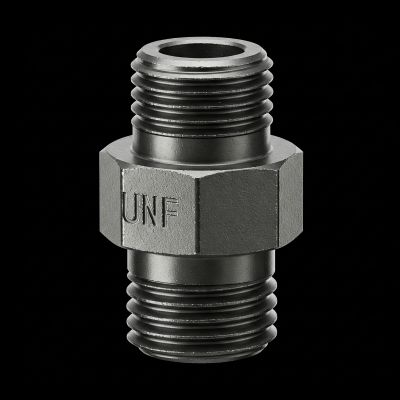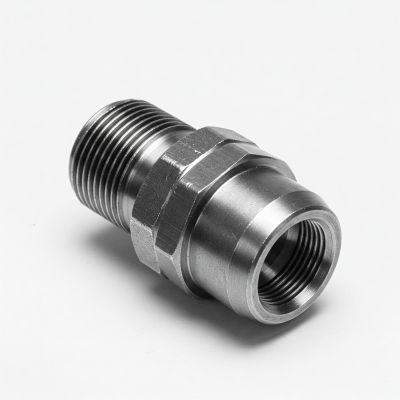Threaded fasteners are ubiquitous in modern engineering, and critical in connecting components across various industries. While seemingly simple, the choice of thread type significantly impacts performance, durability, and overall system reliability.
This article focuses on understanding the key differences between two prominent thread standards: UNF (Unified National Fine) and UNJF (Unified National Fine Thread).
What are UNF and UNJF Threads?
UNF threads are a common thread standard characterized by a fine pitch, offering a good balance between strength and ease of assembly. They are widely used in various applications due to their versatility.
UNF threads find extensive use in:
➡️ General machinery
➡️ Automotive components
➡️ Industrial equipment
➡️ Construction
Whereas, UNJF threads are a variation of UNF threads with a slightly different thread profile and tighter tolerances. This design modification results in increased strength and resistance to vibration.
UNJF threads are often preferred in applications where high performance and reliability are critical, such as:
➡️ Aerospace
➡️ Military
➡️ High-performance racing
Thread Design Differences
|
Feature |
UNF Threads |
UNJF Threads |
|
Thread Pitch |
Coarser |
Finer |
|
Thread Depth |
Deeper |
Shallower |
|
Thread Profile |
Standard 60-degree profile |
Modified 60-degree profile with tighter tolerances |
|
Tolerance and Fit |
Looser |
Tighter |
|
Strength |
Lower |
Higher |
|
Applications |
General machinery, automotive, industrial equipment |
Aerospace, military, high-performance racing |
|
Resistance to Vibration |
Lower |
Higher |
|
Corrosion Resistance |
Similar, depends on material |
Similar, potentially better due to tighter fit |
|
Wear and Tear |
Lower |
Higher |
|
Cost |
Generally lower |
Generally higher |
➡️ Thread Geometry:
➡ UNF threads have a standard thread profile with a specific pitch and depth.
➡ UNJF threads have a slightly modified profile with a tighter tolerance, resulting in a more robust connection.
➡️ Tolerance and Fit: UNJF threads have tighter tolerances than UNF threads, leading to a more precise fit between mating parts. This tighter fit improves sealing and can enhance performance in applications where leakage or fluid contamination is a concern.
➡️ Thread Strength: Due to their tighter tolerances and modified profile, UNJF threads generally exhibit higher tensile strength and shear strength compared to UNF threads. This makes them suitable for applications that experience high loads and stresses.
Key Applications of UNF vs UNJF
➡️ When to Use UNF Threads:
➡ General-purpose applications where a good balance of strength and ease of assembly is required.
➡ Applications with moderate vibration and load requirements.
➡️ When to Use UNJF Threads:
➡ Applications requiring high strength and resistance to vibration and shock (e.g., aerospace, military).
➡ Applications where precise fit and leak-tightness are critical.
➡️ Examples of Components for Both Thread Types:
➡ UNF: Common in bolts, nuts, screws used in automotive engines, general machinery, and household appliances.
➡ UNJF: Used in aircraft components, high-performance engines, and military hardware.
Performance and Durability
UNJF threads demonstrate superior resistance to loosening due to vibration and shock compared to UNF threads. This is crucial in applications where equipment is subjected to significant dynamic loads.
➡️ Corrosion Resistance: Both UNF and UNJF threads can be made from corrosion-resistant materials like stainless steel. However, the tighter fit of UNJF threads may offer some advantages in certain corrosive environments.
➡️ Wear and Tear: Due to their higher strength and tighter tolerances, UNJF threads generally exhibit better wear resistance and longer service life in demanding applications.
How to Choose Between UNF and UNJF Threads
➡️ Factors to Consider:
➡ Application environment: Consider the operating environment, including vibration, temperature, and exposure to corrosive elements.
➡ Thread strength requirements: Determine the load capacity and stress levels the threads will be subjected to.
➡ Tolerances and manufacturing specifications: Ensure the chosen thread type meets the required tolerances and fits within the manufacturing process.
➡️ Practical Guide for Decision-Making:
➡ For general-purpose applications and moderate load requirements, UNF threads are often a suitable and cost-effective choice.
➡ For applications requiring high strength, precision, and resistance to vibration and shock, UNJF threads are generally preferred.
Conclusion
Understanding the key differences between UNF and UNJF threads is crucial for selecting the appropriate fasteners for any given application. While UNF threads offer a good balance of strength and ease of use, UNJF threads provide superior performance in demanding environments.
By carefully considering the application requirements and consulting with a technical expert, you can ensure the selection of the most suitable thread type for optimal performance and reliability.
Do you have any specific applications in mind where you are considering UNF or UNJF threads? Share your questions or use cases in the comments below for further discussion.
Post time: Feb-05-2025



